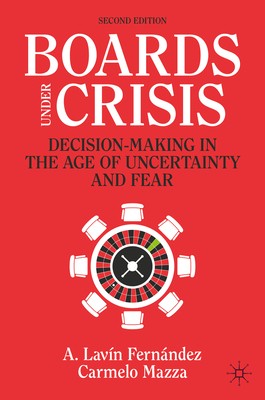
- We will send in 10–14 business days.
- Author: Alberto Lavin Fernandez
- Publisher: Palgrave Macmillan
- ISBN-10: 3031695976
- ISBN-13: 9783031695971
- Format: 15.6 x 23.4 x 1.4 cm, kieti viršeliai
- Language: English
- SAVE -10% with code: EXTRA
Reviews
Description
Crises, in the past, have been cyclical events in economic history. However, we are currently experiencing an acceleration of these cycles with shorter time span in-between major events. In a period of 20 years, from 2001 to 2021, we have lived three global major crisis events: The Twin Tower Attack on September 11th, 2001, the Financial Crash in 2008, and the Covid-19 pandemic from 2020.
In the first edition of this book, the authors explained the main decision-making patterns of behavior (i.e. short termism, centralization, and parochialism) that characterized the management processes of Boards of Directors during the financial crash. Now, in this revised and updated second edition, the authors explore the main commonalities and differences between decision making at the top during the previous financial crisis and during the most recent Covid 19 global pandemic, as well as during the inception of the war in Ukraine. In doing so they ask, is this a new crisis or just the "new normal" that businesses and organizations need to face after major catastrophic events?
By first reassessing the very meaning of the word 'crisis, ' the authors explore the relationship between frequent crises, emergency cabinets and socially widespread fear as determinants of a "new normal" rather than as the extraordinary state of our societies. In this sense, the authors identify more nuanced and updated consequences of short termism, centralization and parochialism that could shape the changes after the current crisis and the approach to next crisis to come
EXTRA 10 % discount with code: EXTRA
The promotion ends in 21d.20:09:34
The discount code is valid when purchasing from 10 €. Discounts do not stack.
- Author: Alberto Lavin Fernandez
- Publisher: Palgrave Macmillan
- ISBN-10: 3031695976
- ISBN-13: 9783031695971
- Format: 15.6 x 23.4 x 1.4 cm, kieti viršeliai
- Language: English English
Crises, in the past, have been cyclical events in economic history. However, we are currently experiencing an acceleration of these cycles with shorter time span in-between major events. In a period of 20 years, from 2001 to 2021, we have lived three global major crisis events: The Twin Tower Attack on September 11th, 2001, the Financial Crash in 2008, and the Covid-19 pandemic from 2020.
In the first edition of this book, the authors explained the main decision-making patterns of behavior (i.e. short termism, centralization, and parochialism) that characterized the management processes of Boards of Directors during the financial crash. Now, in this revised and updated second edition, the authors explore the main commonalities and differences between decision making at the top during the previous financial crisis and during the most recent Covid 19 global pandemic, as well as during the inception of the war in Ukraine. In doing so they ask, is this a new crisis or just the "new normal" that businesses and organizations need to face after major catastrophic events?
By first reassessing the very meaning of the word 'crisis, ' the authors explore the relationship between frequent crises, emergency cabinets and socially widespread fear as determinants of a "new normal" rather than as the extraordinary state of our societies. In this sense, the authors identify more nuanced and updated consequences of short termism, centralization and parochialism that could shape the changes after the current crisis and the approach to next crisis to come


Reviews